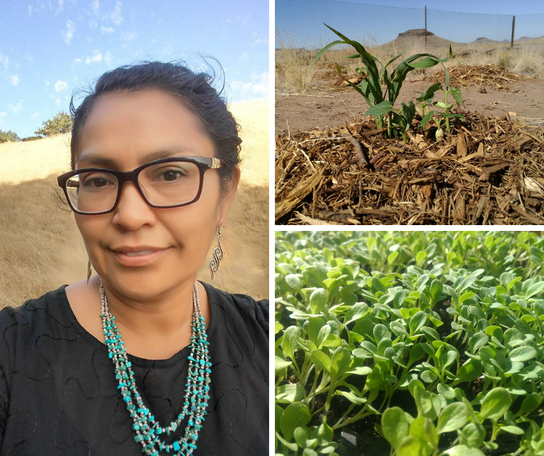|
In honor of Women’s History Month, we’re highlighting women in Arizona who are making a difference in their communities and across the state. This week, we shine the spotlight on Cherilyn Yazzie. Cherilyn runs Coffee Pot Farms, and is a leader when it comes to promoting food sovereignty in her community. Here is her story: What is Coffee Pot Farms’ mission? Coffee Pot Farms aims to provide naturally-grown produce to families across the Navajo Nation and Arizona that is in line with our culture, sovereignty and respect for our mother earth. We believe that food is our first medicine as it comes from our mother earth. We believe food sovereignty is our future and the critical step to creating healthy communities and families. We grow and offer our non-GMO produce at farmers markets, through our community supported agriculture (CSA), and through our farm stand. Coffee Pot Farms is also a newly SNAP-authorized site. We’ve completed the construction of a 400-square foot passive solar green house to expand the growing season that will offer naturally grown produce at farmers markets and farm stands. We have already started growing lettuce, bok choy, brassicas, tomatoes, sweet and hot peppers, onions, spinach and beets. Later this year, we will be constructing two hoop houses, which will extend our growing season and allow us to produce more food. To help our tribal chapter houses tackle food sovereignty issues, we’ve provided free garden workshops in our communities, and joined coalitions to write and define food policies that work towards a culturally appropriate food system. Why is it important to spread awareness about food sovereignty? Connection to land and agriculture is a foundation of the Dine people. Despite this foundation, what was once a community deeply connected to healthy cultural food practices has now been displaced by a proliferation of unhealthy convenience foods. Our community has now been designated as a low-income and low-supermarket-access census tract by the United States Department of Agriculture (USDA). Even with the farming and agricultural roots of the community, the local food environment is extremely limited in access to fresh, healthy, and affordable foods. Coffee Pot Farms is a 36-acre farm located in Dilkon, Arizona that aims to change that. How was Coffee Pot Farms started? What was the inspiration that sparked this effort? Growing food is in our DNA. We need to revitalize our cornfields and to have access to fresh produce. Coffee Pot Farms was started because I couldn’t see my full-time job in public health nutrition service programs helping low income moms get healthy, nutrient-dense foods on their tables for their children. Sometimes, our food systems have too many layers and policies that can get in the way of having access to food. My husband and brother were also recruited to get Coffee Pot Farms off the ground. We realize that we need to help each other to make this work. We each have our strengths and weaknesses and we put them in motion to start Coffee Pot Farms. The inspiration for me started with my grandparents. Currently, my grandmother, who is in her 90’s, stopped herding her sheep about three years ago. My paternal grandpa passed away six years ago and he worked into his mid-70s. He was injured while working in his hay barn and fell, sustaining a brain injury which prevented him from working again. He lived into his eighties. These two people are my inspiration. They never asked for permission to do something. They seemed to just do it. They have a Navajo discipline I admire. Anytime I get tired I think about my grandparents and ask myself if they would be crying about getting tired. Probably not. So, I get up and just do what needs to be done. What is the most rewarding thing about the work you do? The most rewarding thing about our work is it takes only 20 steps from the front door to the passive solar green house to plant and grow food. It’s building healthy soils. It’s driving my old truck to haul water. It’s putting up a new fence for my seed garden. It’s watching your plants grow into food. It’s eating fresh spinach and beets for the first time. It’s cooking with the garlic you grew last season. It’s getting a chance to hang out with my husband every day in the garden. It’s watching him eat vegetables that he never liked, but he eats them anyway because he grew them. It’s seeing that we can be sustainable. It’s about motivating and teaching others how to grow their own food. I can’t wait to get our produce on the tables of the moms and children in our communities.
0 Comments
Leave a Reply. |
Pinnacle Prevention BlogFollow our blog for tips, insights and conversations about healthy living. Archives
June 2024
Categories
All
|
Location |
|


